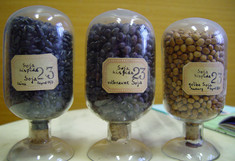A little bit of History
Plant Breeding at BOKU has a long tradition
Our story begins with the founding of the k.k. Hochschule für Bodencultur (today BOKU-University) in 1872.
Agronomy professor Friedrich Haberlandt was far ahead of his time. From the very beginning, he had a strong interest in seeds and varieties, and he was the first outside Asia to recognize and research the high value of soybeans. Friedrich Haberlandt was a leading agricultural scientist of his time at the end of the 19th century.
Carl Fruhwith gave the first lecture on plant breeding at the then k.k. Hochschule für Bodencultur, Vienna in 1892, eight years before Mendel's laws of inheritance were “re-discovered”, but empirical plant breeding already emerged as an academic discipline. The subject plant breeding was obviously brand new at that time, as the first academic lecture on this topic was given by Kurt von Rümker at the University of Göttingen in 1889, only three years earlier than Fruhwirth's lecture in Vienna.
Carl Fruhwirth was undoubtedly a leading agricultural scientist of his time, teaching at the k.k. Hochschule für Bodencultur, the Agricultural Academy in Hohenheim (Baden-Württemberg), and the k.k. Technische Hochschule in Vienna. The name Carl Fruhwirth is still closely associated with the State Seed Breeding Institute in Hohenheim situated in the Fruhwirthstrasse. Carl Fruhwirth was the first editor of the “Zeitschrift fuer Pflanzenzuechtung” in 1913, which is still widely read and cited today under the name Plant Breeding, as well as several high-circulation textbooks: Handbuch der landwirtschaftlichen Pflanzenzüchtung in five volumes.
Erich Tschermak-Seysenegg taught at BOKU from 1902 to 1941. For a long time, he was considered one of the three re-discoverers of Mendel's laws of inheritance, an attribution that has, however, been questioned. Tschermak-Seysenegg was undoubtedly a formative figure in plant breeding and breeding research and a highly decorated scientist in the first half of the 20th century.
Hubert Bleier, a cytogneticist, was associate professor of plant breeding and genetics from 1941 to 1945.
In 1946, the Chair of Plant Breeding was merged with the Chair of Plant Production to form the Institute of Plant Production and Plant Breeding, headed by the agronomist Michael Kopetz. The subject of plant breeding was represented by associate professor Gustav Wunderlich.
An outstanding personality in Austrian plant breeding since 1945 was Hermann Hänsel, who taught elective courses at BOKU as an associate professor, but devoted his main attention to practical breeding and variety development. He published highly innovative scientific articles and at the same time released a range of breakthrough cultivars of wheat, durum wheat and barley.
Since 1971, Peter Ruckenbauer taught plant breeding, until accepting a position at the University of Hohenheim in 1983. Lecturer Rainer Hron took over the teaching of plant breeding at BOKU.
Peter Ruckenbauer returned to BOKU in 1989, and thanks to his efforts, the professorship for plant breeding was reestablished at BOKU in 1991 after a vacancy of 45 years. This was followed by the establishment of the Institute for Plant Breeding and the Interuniversity Research Institute for Agricultural Biotechnology (IFA-Tulln), which Prof. Peter Ruckenbauer headed for many years. Peter Ruckenbauer retired in 2005, leaving behind a well-established institution.
Since 2009, Hermann Buerstmayr was appointed professor for plant breeding at BOKU and has been leading this scientific discipline at BOKU University. In 2025 plant breeding at BOKU University found a new home base at the Institute for Crop Plant Breeding and Genomics.
Reference:
Steiner AM (1999) On the history of plant breeding in Vienna: Haberlandt, Fruhwirth, Ruckenbauer – Saat und Ernte. Die Bodenkultur, 50(3), 203-210. > full text

